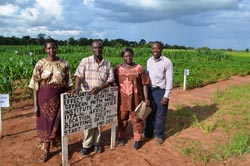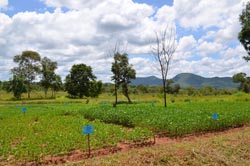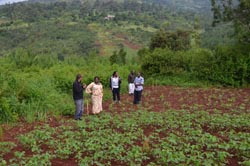Linkages among soyabean value chain actors in Tanzania are weak and coordination between participants and enterprises seem to be a totally alien concept. For over one year now, N2Africa and CRS led - Soya ni Pesa project (SnP) have been working to foster partnerships in soyabean value chain development. As meaningful partnership starts to develop, a strong team from N2Africa and SnP, once again, took the initiative to meet various stakeholders. This time to monitor activities and identify on ground challenges and opportunities to expand collaboration.
 |
Halima Nyange, Aida Magelanga, Fred Kanampiu and Freddy Baijukya proudly introducing a long term experiment in Songea District that examines the long-term rotational effects on soyabean |
The visiting team included Director of SnP Mr Amsalu Gebreselassie, his deputy Neema Mrema, SnP production manager Dr Abubakary Kijoji, N2Africa team leader Professor Ken Giller, N2Africa co-ordinator Dr Fred Kanampiu and coordinator of N2Africa in Tanzania, Dr Frederick Baijukya. Others were Aida Magelanga from Agricultural Research Institute Uyole (ARI-Uyole) and Mr David Inyani, marketing and quality production manager of Promasidor-Kenya.
The three-day field visit, 10-13 March, included visits to District Commissioner (DC) for Songea; six farmer groups in demonstration and production of soyabean in Songea, Namtumbo and Ludewa districts; N2Africa-ARI Uyole collaborative trials on soyabean variety evaluation, soyabean disease monitoring and soyabean-maize rotation trials; SILVERLAND company at Makota in Mufindi district (in production of soyabean, manufacturer of animal feed and producers of day-old-chicks); and finally the Anchor Farm project managed by Clinton Development Initiative (CDI), located at Dabaga in Kilolo district.
At the District Commissioner’s Office in Sangea, the team was welcomed by District Administrative Secretary (DAS) Mr Juma Ally. Speaking on behalf of district commissioner, Mr Juma assured N2Africa and SnP of support from district government in execution of activities. The team discussed further collaboration between the projects other initiatives by the district. In this respect, the district requested the project to provide technical support to district’s agriculture department so at to relaise the long term plan of making soyabean become a major cash crops for Songea district. Addressing farmers at Maposeni village, Mr Juma urged farmers to expand soyabean fields to a commercially viable size and to grow the crop using recommendations by the projects.
 |
Left: In the south of Tanzania with CRS and the Soya ni Pesa project. Guess - which are the inoculated plots in this on-farm demo? Right: CRS and N2Africa staff discussing some of the problems of seed multiplication in southern Tanzania |
 |
Traversing through a number of villages, the team noted steady expansion of soyabean fields. Farmers are growing soyabean, some expanding soyabean fields to above 30 acres, at the expense of maize, the staple and traditional cash crop. However, constraints including pest and diseases, poor quality seed and nutrients depleted soils are major challenges across many farms. Nevertheless farmers have higher expectations from growing soyabean as they indicated the crops has low production costs and good price compared with maize. Given possible price fluctuation and possible loss of soyabean yields due to above biophysical factors, N2Africa and SnP need to focus on introducing to farmers other benefits of growing soyabean including household nutrition, value addition and its rotational benefit to maize in order keep farmer’s interest to grow soyabean.
At SILVERLAND-Makota farm, the team was informed of the company’s plans to expand production of animal feed from the current 4,000 MT per year to above 10,000 MT by 2016 and to 60,000 MT in the next 5 years, where soyabean account for 20% of feed ingredients. The company has also installed soyabean oil extruder plant with readily available market for soyabean oil. This new development not only adds value to soyabean but also creates markets for soyabean varieties with high oil contents including Semeki and Spike being promoted by SnP and N2Africa. With sizeable demand of soyabean and social responsibility agendas make SILVERLAND a potential partner to N2Africa and SnP.
Concluding the three day visit at Anchor Farm project, the team was introduced to the core business of the farm. This included production of maize and soyabean seeds there by increasing the availability of high quality seed to the domestic market, encouraging smallholder farmers to grow soyabean as a rotation crop. The Anchor Farm acts as hub for the distribution of inputs, collection of crops after the harvest, and organization of smallholder clubs. The team had opportunity to visit soyabean seeds multiplication fields on 100 ha. With the land size of about 300,000 ha, state-of-the-art farm machinery and technical expertise, the Anchor Farm is well positioned to multiply significant amounts of soyabean seed to supply to farmers in the southern highlands. It was however, noted that lack of well adapted soyabean varieties, unreliable supply of quality seed are major bottlenecks to soyabean seed multiplication. The team also visited smallholder farmer schemes demonstrating good agronomic practices of soyabean and maize including rotation of two crops. These activities complement well with those of Soya ni Pesa and N2Africa and expands the scope to reach more farmers in the southern highlands.
In the second week of May, 2015, N2Africa and SnP will facilitate soyabean stakeholder meeting to launch Soyabean Innovation Platform in Tanzania. The platform members are drawn from farmers groups, buyers, processors, researchers and policy makers. It is through this innovation platform where identified areas of collaboration will be further discussed and activities for joint implementation identified and agreed.
Freddy Baijukya and Ken Giller
